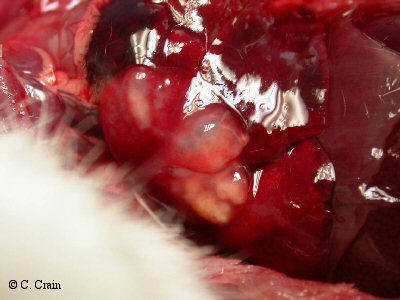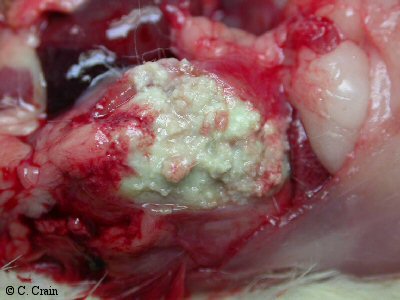Figure 1: Mycoplasmosis in female rat (Renda Lynn).
Case history and photos.
History
Renda Lynn was a 1yr 11 mo. old, Seal point Siamese, smooth coat, dumbo eared rat; weighing 425 grams . She was the mother of 3 males born with hydrocephaly. She lived with 12 other cage mates. She was on once daily Naxcel (ceftiofur) injections since January, and dexamethasone injections about once a month during respiratory crisis. She died in June.
Of her babies, most of them have also encountered respiratory problems. One died of respiratory involvement before she did. The baby that died was only mildly afflicted with hydrocephaly. The babies with moderate and severe hydrocephaly continue to experience respiratory problems, as well as do the normal babies she had. The babies with moderate and severe hydrocephaly are still alive but do have a very raspy type of breathing and are on Naxcel injections, and dexamethasone when in distress, which is once to twice a month. Four of Renda Lynn’s babies are on continuous antibiotics and dexamethasone (when needed) due to respiratory problems. A few of her litter have been shown to be free of any respiratory problems thus far.
Clinical Signs
Renda Lynn began having heavy raspy breathing, and congestion, in January. She was brought to the vet immediately to be seen. Since her breathing never seem to improve, the vet said, she would most likely need to stay on antibiotics for life just to maintain a degree of quality for her few remaining months.
Diagnosis
Severe respiratory infection possibly related to mycoplasma.
Prognosis poor
Treatment
Naxcel (concentration of 50mg/ml) injection given daily starting with .05mL for a week. One initial dexamethasone (concentration of 2mg/ml) injection of 0.2ml also given. She was taken in for a scheduled check up one week later. The checkup showed no improvement.
She was prescribed Naxcel and dexamethasone for treatment at home, and was brought back again after a month. The vet again noted absolutely no improvement in her condition.
Renda Lynn was on 0.01ml Naxcel daily for life and dexamethasone (about 0.2ml) when she went into a respiratory crisis. This crisis would occur about once a month for the first two months, then twice a month for the next two months, and then weekly her last three weeks of life. In each of these crisis she would respond to the dexamethasone within a few hours, where she would breath more freely and seem to perk up. Eventually she completely stopped responding to the dexamethasone at which time the decision was made to euthanize.
Unfortunately it was a very difficult euthanasia. Although the vet did administer gas first before giving an intracardiac injection, when he tried to inject the heart he kept pulling back pus. It would require him to change the needle on the syringe, because the needle would clog with pus.
At the time of euthanasia the vet requested permission to do a necropsy, and permission was given.
Outcome
It was felt that the treatment did give her the extra 5 months of quality life. And her last few months did appear to be happy ones. However, it did take devoted time to give daily injections. She lived to 1yr 11mo. It is difficult to say how long she would have lasted with no treatments, possibly 1 or 2 months at best.
Followup
The necropsy results reflected a diagnosis of severe mycoplasma infection.
Photos
The following digital images 1-3 are of the necropsy pictures of Renda’s lungs showing abscess, and the presence of pus in the middle lobe.
 Photo 1: Lung tissue |
 Photo 2: Lung abscess |
 Photo 3: Presence of pus |
Case history and photos courtesy of
Charlene M. Crain, MBA, BSMT (ASCP) and
Dr. Greg Rich, DVM, at West Esplanade Veterinary Hospital


